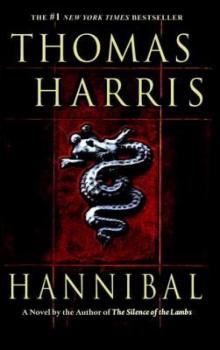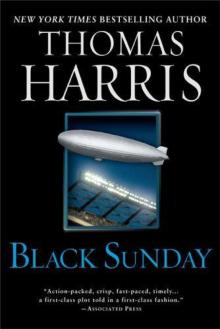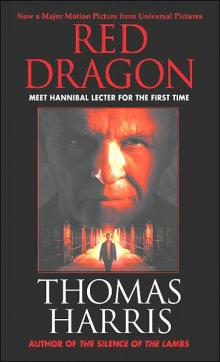- Home
- Thomas Harris
Black Sunday Page 8
Black Sunday Read online
Page 8
During the first month of his confinement in Hanoi, Lander was half crazy with the pain in his hand. He was in a cell with an Air Force navigator, a thoughtful former zoology teacher named Jergens. Jergens put wet compresses on the mangled hand and tried to comfort Lander as best he could, but Jergens had been confined for a long time and he was very shaky himself. Thirty-seven days after Lander arrived, Jergens reached the point where he could not stop yelling in the cell and they took him away. Lander cried when he was gone.
One afternoon in the fifth week, a young Vietnamese doctor came into the cell carrying a small black bag. Lander shrank away from him. He was seized by two guards and held while the doctor injected a powerful local anesthetic into his hand. The relief was like cool water flowing over him. In the next hour, while he could think, Lander was offered a deal.
It was explained to him that the Democratic Republic of Vietnam’s medical facilities were terribly inadequate to treat even their own wounded. But a surgeon would be provided to repair his hand and drugs would be administered to ease the pain—if he signed a confession of his war crimes. It was clear to Lander that if the mangled meat at the end of his arm were not repaired, he would lose the hand and possibly the entire arm. He would never fly again. He did not believe that a confession signed under these circumstances would be regarded seriously at home. Even if it was, he preferred the hand to anyone’s good opinion. The anesthetic was wearing off. Pain was beginning to shoot up his arm again. He agreed.
He was not prepared for what came next. When he saw the lectern, the room full of prisoners sitting like a class, when he was told that he must read his confession to them, he froze.
He was hustled into an anteroom. A powerful hand smelling of fish was clamped over his mouth while a guard twanged his metacarpals. He was about to faint. He nodded frantically, straining against the hand over his face. He was given another shot while the hand was tied out of sight beneath his jacket.
He read, blinking in the lights, while the movie camera whirred.
Sitting in the front row was a man with the leathery, scarred head of a plucked hawk. He was Colonel Ralph DeJong, senior American officer at the Plantation prison camp. In his four years of imprisonment, Colonel Dejong had done 258 days of solitary confinement. As Lander completed his confession, Colonel Dejong spoke suddenly, his voice carrying through the room. “It’s a lie.”
Two guards were on Dejong instantly. They dragged him from the room. Lander had to read the conclusion a second time. Dejong served one hundred days in solitary confinement on reduced rations.
The North Vietnamese fixed Lander’s hand at a hospital on the outskirts of Hanoi, a stark building whitewashed inside, with cane screens over the openings where the windows had been blown out. They did not do a pretty job. The red-eyed surgeon who worked on Lander did not have the training for cosmetic surgery on the red spider clamped to his table, and he had few drugs. But he had stainless-steel wire and ligatures and patience and, eventually, the hand functioned again. The doctor spoke English and exercised his English on Lander in maddeningly tedious conversations while he worked.
Lander, desperate for some distraction, looking anywhere but at his hand while the work went on, saw an old French-made resuscitator, obviously unused, in the corner of the operating room. It was driven by a DC motor with an eccentric flywheel pumping the bellows. Gasping, he asked about it.
The motor was burned out, the doctor said. No one knew how to fix it.
Driving his attention into any corner where it might escape the pain, Lander talked about armatures and how they are rewound. Beads of sweat stood out on his face.
“Could you repair it?” The doctor’s brow was furrowed. He was tying a tiny knot. The knot was no bigger than the head of a fire ant, no bigger than a tooth pulp, bigger than the blazing sun.
“Yes.” Lander talked about copper wire and reels, and some of the words were cut off in the middle.
“There,” the doctor said. “That finishes you for now.”
The majority of American POWs behaved in a manner admirable in the eyes of the American military. They endured for years to return to their country with a crisp salute slanting above their sunken eyes. They were determined men with strong, resilient egos. They were men for whom beliefs were possible.
Colonel Dejong was one of these. When he emerged from solitary confinement to resume command of the POWs he weighed 140 pounds. Deep in his skull his eyes glowed redly, as a martyr’s eyes reflect the fire. He had not passed judgment on Lander until he saw him in a cell with a spool of copper wire, rewinding the armature on a North Vietnamese motor, a few fishbones beside him on a plate.
Colonel Dejong passed the word and Lander received the Silence in the compound. He became an outcast.
Lander had never been able to bring his usual level of craftsmanship to bear on the jerry-built system of defenses that allowed him to survive. His disgrace before the other prisoners, the isolation that came later, were all the old, bad times come back again. Only Jergens would talk to him and Jergens was often in solitary. He was taken away whenever he could not stop yelling.
Weakened by his wound, riddled with malaria, Lander was stripped down to his two ill-matched parts—the child, hated and hating, and the man he had created in the image of what he wanted to be. The old dialogues in his head resumed, but the voice of the man, the voice of sanity remained the stronger. He endured in this state for six years. It took more than prison for Lander to let go and allow the child to teach the man to kill.
On the last Christmas of his captivity, he was given one letter from Margaret. She had a job, it said. The children were all right. A picture was enclosed, Margaret and the children in front of the house. The children were longer. Margaret had gained a little weight. The shadow of the person who took the picture lay in the foreground. The shadow was wide. It fell on their legs. Lander wondered who had taken the picture. He looked at the shadow more than he looked at his wife and children.
On February 15, 1973, Lander was led aboard an Air Force C-141 at Hanoi. An orderly fastened his seat belt. He did not look out the window.
Colonel Dejong was also on the plane, though he was hard to recognize. His nose had been broken and his teeth kicked out in the past two years as he set an example of noncooperation for his men. Now he set an example by ignoring Lander. If Lander noticed, he did not show it. He was gaunt and sallow and subject any second to a malarial chill. The Air Force doctor aboard the plane kept a close eye on him. A refreshment cart went up and down the aisle constantly.
A number of officers had been sent along on the plane to talk with the POWs, if they wanted to talk. One of these men sat by Lander. Lander did not want to talk. The officer called his attention to the goodie wagon. Lander took a sandwich and bit into it. He chewed several times, then spit the bite into his barf bag. He put the sandwich in his pocket. Then he put another sandwich in his pocket.
The officer beside him started to reassure him that there would be plenty of sandwiches, then decided against it. He patted Lander’s arm. No response.
Clark Air Force Base, the Philippines. A band was there, and the base commander, ready to greet the men. Television cameras were waiting. Colonel Dejong was to be first off the plane. He walked down the aisle toward the door, saw Lander, and stopped. For a second there was hate in Dejong’s face. Lander looked up at him and quickly turned away. He was trembling. Dejong opened his mouth, then his expression softened by a millimeter and he walked on, into the cheers, into the sun.
Lander was taken to St. Alban’s Naval Hospital in Queens. There he began a journal, a project he would not continue long. He wrote very slowly and carefully. He was afraid that if he went any faster, the pen might get away from him and write something he did not wish to see.
Here are the first four entries:
St. Alban‘s, March 2.
I am free. Margaret came to see me every day for the first eight days. She has come three times this week. The other day
s she had car pool. Margaret looks well, but not like I thought about her back there. She looks like she is satisfied all the time. She brought the girls twice. They were here today. They just sat and looked at me and looked around the room. I kept my hand under the sheet. There is not much for them to do in the hospital. They can go down to the rec room and get a Coke. I must remember to get some change. Margaret had to give them the change. I suppose I look strange to them. Margaret is very good and patient and they obey her. I dreamed about the Weasel again last night and I was absent-minded talking to them today. Margaret keeps up the conversation.
St. Alban‘s, March 12.
The doctors say I have falciparum malaria and that is why the chill cycle is irregular. They are giving me chloroquine, but it doesn’t work immediately. A chill caught me today while Margaret was here. She has her hair cut short now. It does not look like her too much, but it smells good. She held me during the chill. She was warm, but she turned her face away. I hope I don’t smell bad. Maybe it’s my gums. I’m afraid Margaret will hear something. I hope she never saw the film.
Good news. The medics rate my hand only ten percent impaired. It should not affect my flying status. Margaret and the kids will have to see it sooner or later.
St. Alban‘s, March 20.
Jergens is down the hall. He hopes to go back to teaching, but he is in bad shape. We were cellmates exactly two years, I think. He says it was 745 days. He is dreaming, too. Sometimes the Weasel. He has to have the door of his room open. It was all the solitary toward the last that brought him down. They would not believe that he wasn’t yelling deliberately in the cell at night. The Weasel yelled at him and called General Smegma. Smegma’s real name was Capt. Lebron Nhu, I must remember that. Half French, half Vietnamese. They shoved Jergens back against the wall and slapped him and this is what Jergens said:
“Various species of plants and animals carry lethal factors which, when homozygous, stop development at some stage and the individual dies. A conspicuous case is that of the yellow race of the house mouse, mus musculus, which never breeds true. This should be of interest to you, Smegma. (That was where they started trying to drag him out of the cell.) If a yellow mouse is mated to some nonyellow, half the young are yellow and half are nonyellow (Jergens was holding on to the bars then and Weasel went outside to kick his fingers), a ratio to be expected from mating a heterozygous animal, yellow, with a homozygous recessive, any nonyellow such as agouti, a small voracious rodent, slender legged, resembling a rabbit but with smaller ears. If two yellows are mated together, the young average two yellow and one nonyellow, whereas the expected ratio among the young would be one pure yellow to two heterozygous yellow to one nonyellow. (His hands were bleeding and they were dragging him down the hall and him still yelling.) But, the ‘homozygous yellow’ dies as an embryo. That’s you, Smegma. The ’creeper fowl’ with short, crooked legs behaves genetically like the yellow mouse.”
Jergens had six months solitary for that and lost his teeth on the diet. He had that about the yellow mouse scratched on the slats in his bunk and I used to read it after he was gone.
I am not going to think about that anymore. Yes I am. I can say it to myself during the other things. I must raise this mattress and see if anyone in the hospital has scratched on the slats.
St. Alban‘s, April 1, 1973.
In four days I can go home. I told Margaret. She will trade days in the car pool to come get me. I have to be careful with my temper, now that I am stronger. I blew up today when Margaret told me she had arranged to trade cars. She told me she ordered the station wagon in December, so it’s already done. She should have waited. I could have gotten a better deal. She said the dealer was giving her a very special deal. She looked smug.
If I had a protractor, a level, navigation tables and a string I could figure out the date without a calendar. I get one hour of direct sunlight through my window. The strips of wood between the windowpanes make a cross on the wall. I know the time and I know the latitude and longitude of the hospital. That and the angle of the sun would give me the date. I could measure it on the wall.
Lander’s return was difficult for Margaret. She had begun to build a different life with different people in his absence, and she interrupted that life to take him home. It is probable that she would have left him had he come home from his last tour in 1968, but she would not file for a divorce while he was imprisoned. She tried to be fair, and she could not bear the thought of leaving him while he was sick.
The first month was awful. Lander was very nervous, and his pills did not always help him. He could not stand to have the doors locked, even at night, and he prowled the house after midnight, making sure they were open. He went to the refrigerator twenty times a day to reassure himself that it was full of food. The children were polite to him, but their conversation was about people he did not know.
He gained strength steadily and talked of returning to active duty. The records at St. Alban’s Hospital showed a weight gain of eighteen pounds in the first two months.
The records of the Judge Advocate General of the Department of the Navy show that Lander was summoned to a closed hearing on May 24 to answer charges of collaboration with the enemy lodged by Colonel Ralph Delong.
The transcript of the hearing records that Exhibit Seven, a piece of North Vietnamese propaganda film, was shown at the hearing, and that, immediately afterward, the hearing was recessed for fifteen minutes while the defendant excused himself. Subsequently, testimony by the defendant and by Colonel Dejong was heard.
The transcript on two occasions records that the accused addressed the hearing board as “Mam.” Much later, these quotations were considered by the blue-ribbon commission to be typographical errors in the transcript.
In view of the accused’s exemplary record prior to capture and his decoration for going after the downed air crew, the action that led to his capture, the officers at the hearing were inclined to be lenient.
A memorandum signed by Colonel Dejong is affixed to the transcript. It states that, in view of the Defense Department’s expressed wish to avoid adverse publicity regarding POW misconduct, he is willing to drop the charges “for the larger good of the service” if Lander offers his resignation.
The alternative to resignation was court martial. Lander did not think he could sit through the film again.
A copy of his resignation from the United States Navy is attached to the transcript.
Lander was numb when he left the hearing room. He felt as if one of his limbs had been struck off. He would have to tell Margaret soon. Although she had never mentioned the film, she would know the reason for his resignation. He walked aimlessly through Washington, a solitary figure on a bright spring day, neat in the uniform he could never wear again. The film kept running in his head. Every detail was there, except that, somehow, his POW uniform was replaced with short pants. He sat down on a bench near the Ellipse. It was not so far to the bridge into Arlington, not so far to the river. He wondered if the undertaker would cross his hands on his chest. He wondered if he could write a note requesting that the good hand be placed on top. He wondered if the note would dissolve in his pocket. He was staring at the Washington Monument without really seeing it. He saw it with the tunnel vision of a suicide, the monument standing up in the bright circle like a post reticule in a telescopic sight. Something moved into his field of vision, crossing the bright circle, above and behind the pointed reticule.
It was the silver airship of his childhood, the Aldrich blimp. Behind the still point of the monument he could see it por poising gently in a headwind and he gripped the end of his bench as though it were the elevator wheel. The ship was turning, turning faster now as it caught the wind on the starboard side, making a little leeway as it droned over him. Hope drifted down upon Lander through the clear spring air.
The Aldrich Company was glad to have Michael Lander. If the company officials were aware that for ninety-eight seconds his face had appeared on network
television denouncing his country, they never mentioned it. They found that he could fly superbly and that was enough.
He trembled half the night before his flight test. Margaret had great misgivings as she drove him to the airfield, only five miles away from their house. She needn’t have worried. He changed even as he walked toward the airship. All the old feeling flooded him and invigorated him and left his mind calm and his hands steady.
Flying appeared to be marvelous therapy for him, and for part of him it was. But Lander’s mind was jointed like a flail, and as he regained his confidence the half of his mind held steady by that confidence gave strength to the blows from the other half. His humiliation in Hanoi and Washington loomed ever greater in his mind during the fall and winter of 1973. The contrast between his self-image and the way he had been treated grew larger and more obscene.
His confidence did not sustain him through the hours of darkness. He sweated, he dreamed, he remained impotent. It was at night that the child in him, the hater, fed by his suffering, whispered to the man.
“What else has it cost you? What else? Margaret tosses in her sleep, doesn’t she? Do you think she gave away a little while you were gone?”
“No.”
“Fool. Ask her.”
“I don’t have to ask her.”
“You stupid limpdick.”
“Shut up.”
“While you were squalling in a cell, she was straddling one.”
“No. No. No. No. No. No.”
“Ask her.”
He asked her one cold evening near the end of October. Her eyes filled with tears and she left the room. Guilty or not?
He became obsessed with the thought that she had been unfaithful to him. He asked her druggist if her prescription for birth control pills had been renewed regularly over the past two years and was told that it was none of his business. Lying beside her after yet another of his failures, he was tormented by graphic scenes of her performing acts with other men. Sometimes the men were Buddy Ives and Junior Atkins, one on Margaret, the other awaiting his turn.

 The Silence of the Lambs
The Silence of the Lambs Red Dragon
Red Dragon Hannibal
Hannibal Black Sunday
Black Sunday Cari Mora
Cari Mora Hannibal Rising
Hannibal Rising Red Dragon hl-1
Red Dragon hl-1 The Silence of the Lambs (Hannibal Lecter)
The Silence of the Lambs (Hannibal Lecter)